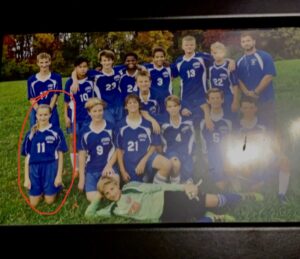In a school of students, a student enters, and belongs, as a student. However if that student is a girl in a class full of boys she is now an “other,” despite being a student like the rest of them. Now if that student is a girl and she is from another country in a class full of boys native to their country, her distinctions from the majority become even more clear. This is not to say every minority is an outsider but rather small or large differences from a majority can quickly make an individual seem as though they don’t belong.
In my life I have been lucky to feel as though I belong in most major social situations. However, on a few notable accounts I can recall feeling like an “other.” For example I was one of 3 Jewish kids in my grade from kindergarten to fifth grade and found myself unable to relate to my peers on most topics regarding religion. In seventh grade I was the only girl on my middle school’s soccer team and despite typically being loud and energetic, I found myself quiet and timid during practice and games. I became friends with one kid on the team, he was the only sixth grader on varsity and I was the only girl, both being on the outs facilitated a friendship between us. Other experiences of being an outsider have spotted my life however none significant enough for me to understand the true isolation being pegged an “other” can have. Looking at another lens, I have never considered what fundamental information I’m losing when I deem someone an “other” along with a group of people rather than considering them as an individual. How many people have I generalized? How many potential friendships have I missed out on due to quick judgements? As I ask myself these questions I reflect on the people in my life who I am quick to call an outsider–those who do not know the same language as me, those who share a different culture, those who have a different lifestyle–and as I think of the people I see as an “other,” I begin to realize it is not a way of viewing people below me, but rather a lazy attempt at categorizing individuals I can not relate to. Instead of seeing these people as individuals, I group them with people I think are similar and limit myself from observing the world without preconceived judgements. I believe this is a fate many fall prey to, but I also believe it can be altered.
Socially, we distinguish ourselves from each other to prevent erasing what makes us unique or fulfilled. Alternatively, we distinguish ourselves in order to belong. As humans, we tend to migrate towards people we share common interests with to foster a sense of belonging, but in doing so we make ourselves an outsider to the other categories of people. But perhaps personal “othering” is okay and the real issue lies when it is a majority looking down on a minority group for being different. In this case, the uses of “othering” can be used by majority powers to fuel their beliefs of superiority and take advantage of others.
Like my example of the school girl–we are all humans so we all belong as humans, but we come from different regions, we speak different languages, practice different religions, and take part in different cultures. As we find solace in those we are alike, we often find isolation in those who are different.

4 responses to “Who is the “Other””
Thank you Eve for this interesting and relatable post! I can definitely see why you felt like an “other” in the examples you mentioned and I would probably feel the same way if I were in your shoes. I found it quite interesting how you mentioned that we often fall prey to categorizing individuals as others without getting to know who they really are. Sometimes I find myself categorizing students from different majors in my university as others. However, as you mentioned, the true problem is when individuals look down upon those who they do not share similar characteristics with. I think we can fix this issue by understanding the beauty of diversity and the importance of accepting others despite what groups they associate with. Do you think there are perhaps other ways we can overcome othering?
Thank you for your thoughtful comment! To answer your question, yes. I definitely believe there are a multitude of ways to overcome harmful “othering,” such as acknowledging we ourselves are “others” in another person’s life and therefore offer empathy to the people we see as different before deeming them below us. Additionally, like you stated, appreciating diversity in all its splendor can help mitigate this issue among other methods.
Thank you Tia for your interesting perspective guided by your real world experiences. I found it unnatural that we so often find ways to categorize people we’ve never even interacted with by labeling them as others. Do you think there is another way to break this societal norm or is it just a part of human nature?
You bring up an extremely interesting point, can we “break this societal norm” or is it merely “human nature?” I think it is in human nature to migrate towards groups we identify with, however I do not think that is dependent on seeing groups we don’t identify with as “others.” However, if it is, it does not need to be malicious as long as we appreciate differences and don’t use them as leverage to divide and demean people. I’m interested to know your thoughts!